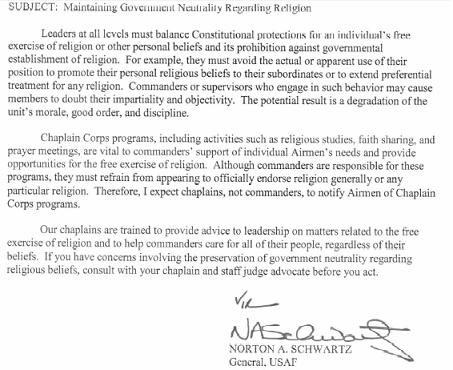Some have suggested that the military’s policy on religious proselytizing is new and perhaps tied to a meeting held recently with Mikey Weinstein, president of the Military Religious Freedom Foundation, and Pentagon leaders. However, this is incorrect. According to DoD spokesman Nate Christensen, the Department of Defense regulations stem from compliance with Equal Employment Opportunity Commission regulations which govern the civilian workforce. By DoD directive 1020.02, the military provides protections to service members at the same level as for civilian employees.
In this case, the relevant EEOC directive is 915.003. Dated August 22, 2008, these guidelines provided examples of appropriate religious accommodations. In addition, guidelines relating to proselytizing are provided. Here is the introduction to the section on proselytizing:
Some employees may seek to display religious icons or messages at their work stations. Others may seek to proselytize by engaging in one-on-one discussions regarding religious beliefs, distributing literature, or using a particular religious phrase when greeting others. Still others may seek to engage in prayer at their work stations or to use other areas of the workplace for either individual or group prayer or study. In some of these situations, an employee might request accommodation in advance to permit such religious expression. In other situations, the employer will not learn of the situation or be called upon to consider any action unless it receives complaints about the religious expression from either other employees or customers. As noted in §§ II-A-3 and III-C of this document, prayer, proselytizing, and other forms of religious expression do not solely raise the issue of religious accommodation, but may also raise disparate treatment or harassment issues.
To determine whether allowing or continuing to permit an employee to pray, proselytize, or engage in other forms of religiously oriented expression in the workplace would pose an undue hardship, employers should consider the potential disruption, if any, that will be posed by permitting this expression of religious belief.[196] As explained below, relevant considerations may include the effect such expression has had, or can reasonably be expected to have, if permitted to continue, on co-workers, customers, or business operations.
Additional guidelines are relevant to the DoD instructions. For instance, under “unwelcome conduct”, the guidelines read:
To be unlawful, harassing conduct must be unwelcome. Conduct is “unwelcome” when the employee did not solicit or incite it and regards it as undesirable or offensive.[84] It is necessary to evaluate all of the surrounding circumstances to determine whether or not particular conduct or remarks are unwelcome.[85] For example, where an employee is upset by repeated mocking use of derogatory terms or comments[86] about his religious beliefs or observance by a colleague, it may be evident that the conduct is unwelcome. This would stand in stark contrast to a situation where the same two employees were engaged in a consensual conversation that involves a spirited debate of religious views, and neither employee indicates that he was upset by it.
The distinction between welcome and unwelcome conduct is especially important in the religious context in situations involving proselytizing of employees who have not invited such conduct.[87] Where a religious employee attempts to persuade a non-religious employee of the correctness of his belief, or vice versa, the conduct may or may not be welcome. When an employee objects to particular religious expression, unwelcomeness is evident.[88]
EXAMPLE 18
Unwelcome Conduct
Beth’s colleague, Bill, repeatedly talked to her at work about her prospects for salvation. For several months, she did not object and discussed the matter with him. When he persisted even after she told him that he had “crossed the line” and should stop having non-work related conversations with her, the conduct was clearly unwelcome.[89]
The DoD has committed to provide their service members with same legal protections as civilian employees. In this case, the guidance was issued long before the current controversy and has nothing to do with a meeting with Mikey Weinstein or a desire to purge Christians from the military. The guidance is designed to protect the rights of people of all faiths.
Related Posts:
Is the Military Preparing to Court Martial Christians?
On the Military and Religious Proselytizing: Military Spokesman’s Original Comments Used Out of Context
Department of Defense Statement on Religious Proselytizing
